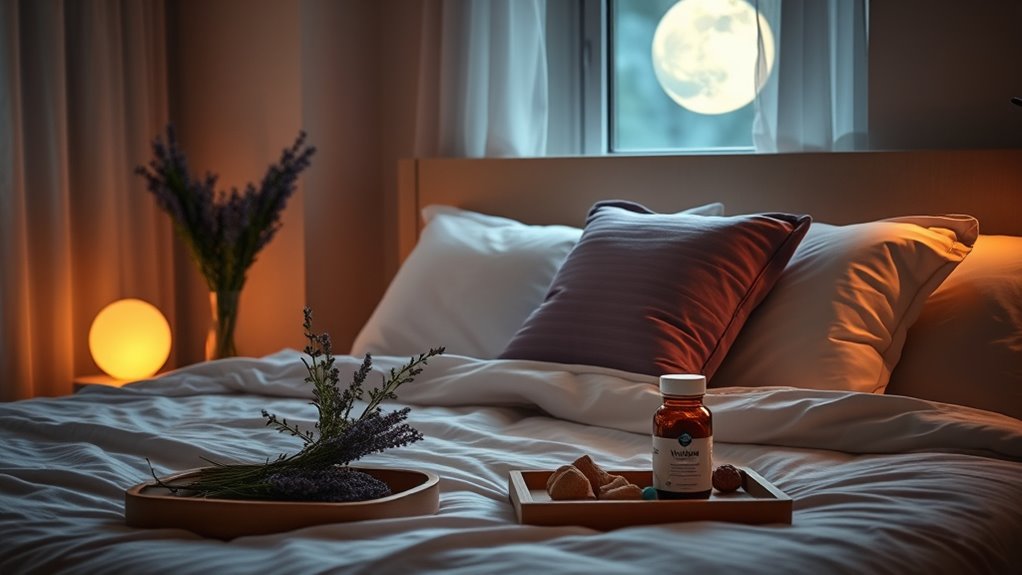To combat menopause insomnia naturally, try calming herbal teas like chamomile or valerian root before bed. Incorporate relaxation techniques such as deep breathing, meditation, or gentle stretching to ease your mind. Maintain a consistent sleep routine and create a cool, dark, quiet environment. Using magnesium supplements and practicing stress reduction can also help. Small lifestyle changes can make a big difference—continue exploring for more effective ways to improve your sleep.
Key Takeaways
- Herbal teas like chamomile and valerian root can promote relaxation and improve sleep quality.
- Magnesium supplements may reduce muscle tension and help alleviate sleep disturbances.
- Maintaining a consistent sleep schedule and bedtime routine supports better sleep during menopause.
- Practicing relaxation techniques such as meditation or deep breathing reduces stress and enhances sleep.
- Creating a cool, dark, and quiet sleep environment minimizes disruptions caused by hot flashes and night sweats.

Are you struggling to get a good night’s sleep during menopause? If so, you’re not alone. Many women find that hormonal fluctuations during this time can wreak havoc on their sleep patterns, making it difficult to fall asleep or stay asleep throughout the night. These hormonal shifts, especially the decline in estrogen and progesterone, can cause hot flashes, night sweats, and increased anxiety—all of which interfere with restful sleep. To combat this, focusing on improving your sleep hygiene can make a significant difference. Sleep hygiene involves establishing habits and a comfortable environment that promote better sleep, and it’s especially important when hormonal changes are disrupting your natural sleep cycle.
Hormonal changes during menopause can disrupt sleep; improving sleep hygiene helps restore restful nights.
Start by creating a consistent sleep schedule. Going to bed and waking up at the same time every day helps regulate your internal clock, making it easier for your body to fall asleep naturally. Avoid caffeine and heavy meals close to bedtime, as these can disturb your sleep and exacerbate hot flashes or discomfort. Instead, opt for light, easily digestible snacks if you’re hungry before bed. Limiting screen time in the hour before sleep is also vital; blue light from phones and computers can suppress melatonin production, making it harder to fall asleep. Instead, try relaxing activities like reading, gentle stretching, or meditation to wind down.
Creating a sleep-friendly environment is another key aspect. Ensure your bedroom is cool, dark, and quiet, as these conditions promote better sleep. Using blackout curtains or a sleep mask can block out disruptive light, while earplugs or white noise machines help drown out sounds that might wake you. Investing in a comfortable mattress and pillows tailored to your preferences can also improve sleep quality. Avoid stimulating activities or stressful thoughts right before bed—practice relaxation techniques to calm your mind. Incorporating mindfulness practices into your nightly routine can further help reduce stress and promote restful sleep. Additionally, some women find that hormonal balance supplements or natural remedies can support sleep during menopause, but it’s best to consult with a healthcare professional before starting any new supplement. Research also shows that consistent sleep routines can significantly enhance overall sleep quality and duration. Maintaining a calm and stress-free environment before bed can further help manage hot flashes that interfere with sleep.
In addition to these sleep hygiene tips, consider natural remedies that address hormonal fluctuations directly. Herbal teas like chamomile or valerian root can promote relaxation, while supplements such as magnesium may help ease muscle tension and improve sleep quality. Regular physical activity during the day can also reduce stress and hot flashes, though avoid vigorous exercise close to bedtime. Managing stress through mindfulness or deep breathing exercises can lower cortisol levels, which often rise during menopause and disturb sleep. Additionally, understanding pinball machine angles and how they can influence gameplay might seem unrelated, but maintaining a relaxed state of mind and reducing stress can also benefit sleep quality.
Frequently Asked Questions
Are Natural Remedies Safe During Menopause?
You might wonder if natural remedies are safe during menopause. Generally, herbal safety varies, so it’s wise to consult with a healthcare provider before trying alternative therapies. While many women find relief with herbal supplements, some herbs can interact with medications or cause side effects. Always research thoroughly and choose reputable sources to guarantee safe use. Your doctor can help you select the best options tailored to your health needs.
How Long Do Natural Remedies Take to Work?
Imagine your remedy timelines unfolding like the sunrise, gradually brightening your nights. Natural remedies vary in herbal effectiveness, taking anywhere from a few days to several weeks to show results. Consistency is key, as your body adjusts and responds over time. While some notice quick relief, others may need patience, trusting that natural remedies work gently and steadily to restore restful sleep during menopause.
Can Natural Remedies Replace Hormone Therapy?
You might wonder if natural remedies can replace hormone therapy. While alternative therapies like herbal supplements can help manage menopause symptoms, they may not be as effective for everyone. It’s crucial to consult your healthcare provider before making changes. Natural remedies work differently for each person, and some may need hormone therapy for relief. Always weigh the benefits and risks, and consider combining approaches for maximum support.
Are There Any Side Effects From Herbal Treatments?
You might wonder if herbal treatments cause side effects. While many are safe, herbal interactions can occur, especially if you’re taking other medications. Dosage concerns also matter; taking too much can lead to adverse effects like digestive issues or allergic reactions. Always consult your healthcare provider before starting herbal remedies to verify proper interactions and dosages, reducing the risk of side effects and making your menopause journey safer.
Should I Consult a Doctor Before Trying These Remedies?
You should definitely consult a doctor before trying herbal remedies. A doctor consultation guarantees herbal safety and helps you understand any potential interactions with medications or underlying health conditions. It’s important to get personalized advice, especially during menopause. Your healthcare provider can guide you on the safest options, so you can address insomnia effectively without risking adverse effects. Prioritizing professional guidance ensures you choose the most appropriate and safe remedy.
Conclusion
By exploring natural remedies for menopause insomnia, you empower yourself to improve your sleep naturally, to restore your rest naturally, and to reclaim your nights naturally. Embrace herbal teas, practice relaxation techniques, and create a calming sleep environment. These simple steps can ease your nights, ease your worries, and ease your passage. Remember, you have the tools within you to find comfort, to find balance, and to find restful sleep—naturally.









